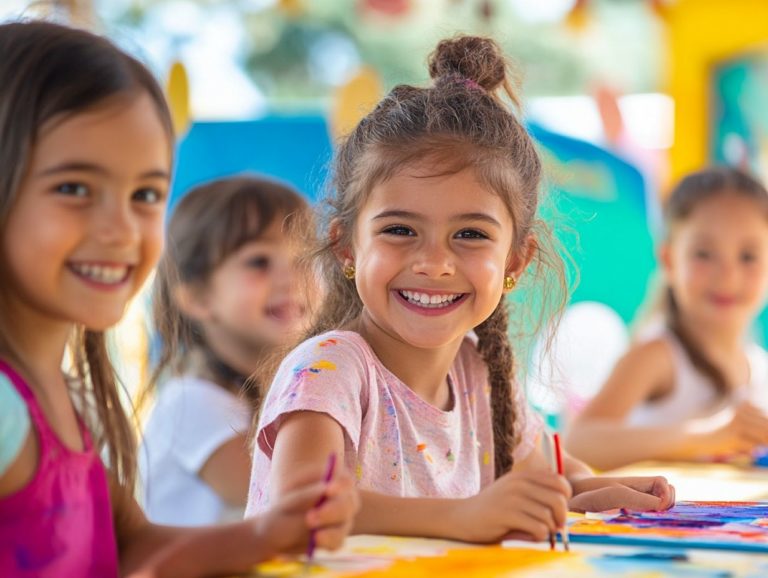Mindful Communication: A Parent’s Guide
Effective communication techniques serve as the foundation for robust parent-child relationships. Yet, many parents grapple to connect with their children on a deeper level.
Mindful communication emerges as a powerful solution. It emphasizes the importance of emotional awareness and intentionality in every interaction.
This article reveals the power of mindful communication and offers actionable strategies to strengthen your bond with your children. You ll discover what mindful communication entails and why it holds significant value for parents. Additionally, you will find practical parenting strategies to elevate your conversations with your children.
Furthermore, it will shed light on common pitfalls to avoid and the myriad benefits that mindful communication can bring to your family dynamics, including trust-building and conflict resolution.
Contents
- Key Takeaways:
- What is Mindful Communication?
- Why is Mindful Communication Important for Parents?
- How to Practice Mindful Communication with Your Children?
- 1. Listen with Empathy
- 2. Use Positive Language
- What Are the Benefits of Mindful Communication for Children?
- 1. Builds Trust and Connection
- 2. Improves Emotional Regulation
- 3. Enhances Problem-Solving Skills
- What are Some Common Communication Mistakes Parents Make?
- How Can Parents Overcome Barriers to Mindful Communication?
- Seek Support and Resources
- Frequently Asked Questions
- Mindful Communication Resources for Parents
Key Takeaways:

- Mindful communication involves listening with empathy and using positive language to connect with your child and validate their feelings.
- Practicing mindful communication benefits children by building trust, improving emotional regulation (the ability to understand and manage one’s emotions), and enhancing problem-solving skills, which are essential aspects of child development.
- To overcome barriers to mindful communication, parents can practice mindfulness, seek support, and be patient and kind with themselves, fostering a positive parenting environment.
What is Mindful Communication?
Mindful communication represents a deliberate and thoughtful approach to your interactions. It focuses on emotional awareness and empathy, especially in the realm of parenting and child development. This technique is a vital component of effective parenting strategies.
This practice helps you understand your children’s feelings and respond appropriately, fostering deeper emotional connections and enriching your overall relationship with them.
By weaving mindfulness into your daily conversations, you can create a safe and trusting environment where your children feel comfortable expressing their emotions. This approach enhances their emotional intelligence.
Engaging in mindful communication greatly enhances emotional regulation and problem-solving skills. It nurtures positive emotional dynamics and fosters better interpersonal relationships within your family.
Why is Mindful Communication Important for Parents?
Mindful communication is crucial for you as a parent. It profoundly shapes the emotional landscape of your child’s development and significantly impacts the quality of your relationship with them. Effective communication methods can set the tone for positive parenting strategies.
Through thoughtful interactions, you can cultivate emotional awareness and understanding within your child, empowering them to articulate their feelings and navigate their emotional responses more effectively.
This approach fosters a deep sense of trust and connection between you and your child. It also promotes positive parenting strategies that can adeptly address developmental challenges and behavioral patterns. Understanding psychological principles can aid in forming these strategies.
How to Practice Mindful Communication with Your Children?
Practicing mindful communication with your children entails the intentional use of various techniques aimed at fostering understanding and empathy in your interactions. You can cultivate this essential skill through active listening, fully engaging with your child’s verbal and non-verbal cues to ensure their emotional needs are acknowledged and validated.
Encouraging curiosity and exploration in their communication plays a crucial role. Additionally, employing exploratory questions encourages your children to express their feelings more openly, nurturing a deeper connection and enhancing their emotional regulation.
By remaining present and aware during conversations, you create a nurturing environment that actively supports your child’s emotional development and their understanding of interpersonal relationships.
1. Listen with Empathy
Listening with empathy is a cornerstone of mindful communication. It empowers you to connect deeply with your child’s emotional responses and feelings. This technique requires you to immerse yourself fully in your child’s words, acknowledging their emotional state and validating their experiences without rushing to judgment or interrupting.
Engage in empathetic listening to cultivate a sense of safety and trust. This encourages your child to express their feelings more openly and honestly. This method also supports their overall psychological well-being.
Creating an environment where your child feels heard enhances their emotional well-being and strengthens the bond between you. Pay attention to body language; maintaining eye contact, nodding, and leaning slightly forward are powerful non-verbal cues that show you are attentive and supportive. These techniques are essential for effective parent-child communication.
By refraining from interrupting and allowing your child to finish their thoughts, you demonstrate respect for their feelings. Reflecting back what they express, such as saying, “It sounds like you’re really upset about what happened at school today,” helps clarify and validate their emotions. These strategies are beneficial for emotional dynamics within the family.
For instance, if your child talks about a tough day at school, this empathetic engagement can work wonders in easing their anxiety and nurturing resilience. Ultimately, this paves the way for more open communication in the future. Such techniques are part of broader communication patterns that positively influence childhood experiences.
2. Use Positive Language
Utilizing positive language is essential for mindful communication. It can significantly deepen the emotional connections between you and your child. This approach involves carefully selecting words that uplift, affirm, and encourage. It reinforces positive behaviors and cultivates trust and mutual respect in your relationship.
By focusing on constructive feedback rather than criticism, you help your child feel valued and understood. This practice is crucial in fostering a supportive psychological environment.
When you embrace positive language, you actively contribute to your child’s emotional intelligence, or their ability to understand and manage emotions. Using phrases like, “I believe in you,” or “You did a fantastic job working through that problem,” can build skills they will use for life. Effective communication styles, such as active listening and empathetic responses, shape how your child perceives themselves and navigates their emotions. These methods are also critical for effective conflict resolution within the family.
Instead of reprimanding your child for making a mistake, consider saying, “Everyone makes mistakes; it s part of learning.” This teaches them to approach challenges with a growth mindset. Such positive dialogue boosts self-esteem and equips your child with the emotional tools to navigate their feelings with greater awareness and maturity. This practice is essential for developing healthy communication patterns and positive behavioral responses.
Try these techniques today to strengthen your bond with your child!
3. Be Present and Engaged

Being present and fully engaged during conversations with children is vital for cultivating meaningful connections and enhancing emotional awareness. When you practice mindfulness in these interactions, you create an environment free from distractions, allowing you to immerse yourself completely in the moment. This approach nurtures deeper understanding and more effective communication methods.
This genuine communication not only respects your child’s feelings and needs but also strengthens the bond between you both while modeling healthy communication skills. It encourages the development of emotional resilience and sensitivity toward others.
By prioritizing focused moments for dialogue think designated family meals or regular check-ins you can effectively minimize external interruptions and open the door to deeper discussions. Techniques such as maintaining eye contact, actively listening, and reflecting back what your child says can significantly enhance this connection. These practices are at the core of effective communication patterns and contribute to a nurturing family environment.
For example, if your child expresses a concern about a friend, taking a mindful approach enables you to validate their feelings, fostering self-expression and emotional resilience. This practice also supports the development of their social skills.
This intentional presence nurtures an environment where your child feels valued and understood, ultimately supporting their social skills. It enhances their emotional development in truly profound ways and can be fundamental in shaping their overall childhood experiences.
4. Validate Your Child’s Feelings
Validating your child’s feelings is an essential aspect of mindful communication, one that nurtures their emotional awareness and instills a sense of security. By acknowledging and affirming their feelings, you provide crucial support that deepens their understanding of emotional dynamics and encourages them to express themselves freely. This validation is a cornerstone of positive parenting strategies.
This practice not only enhances their emotional intelligence but also fortifies the bond between you and your child through heightened trust and connection. These approaches will improve your communication style.
When you actively recognize and validate your child’s emotions be it acknowledging their sadness after losing a cherished toy or celebrating their excitement for an upcoming event you convey that their feelings truly matter. This simple affirmation can foster resilience, helping them learn how to cope with their emotions effectively and equipping them with vital tools for future interpersonal interactions. Such validation strengthens their understanding of emotional dynamics and fosters a deep emotional connection.
Over time, your consistent validation can lead to improved self-esteem and healthier relationships. As your child matures into adulthood, they will be better prepared to empathize with others and navigate the intricacies of social connections. This builds a strong foundation for positive interpersonal relationships throughout their life.
Start today by actively listening to your child your effort will reap lasting rewards!
What Are the Benefits of Mindful Communication for Children?
The benefits of mindful communication for children are truly remarkable, significantly enhancing their overall development and emotional well-being. These benefits are supported by principles of developmental psychology.
By engaging in mindful conversations, you foster their emotional regulation, empowering them to better understand and manage their feelings. This increased emotional awareness means helping them understand and control their feelings, combined with enhanced problem-solving skills, equips them to navigate challenges more effectively.
As a result, they cultivate healthier interpersonal relationships and develop a strong sense of trust with you as their parent. These interactions can significantly influence their psychological and emotional development.
Don’t wait embracing mindful communication now can set your child on a path to emotional success!
1. Builds Trust and Connection
Building trust and connection is fundamental for strong parent-child relationships. Mindful communication enhances the depth of feelings shared, fostering a more secure and supportive environment.
It is essential for you to build trust and form a genuine connection with your children. This creates a safe haven for their emotional expression. When you engage in empathetic listening and validation, your children feel secure and understood, which significantly enhances their emotional bonds with you.
This trust sets the stage for open dialogue and deepens your relationship over time. Experts like Morgan Bravo highlight that mindful interactions can significantly impact a child’s development.
As your children experience consistent and thoughtful interactions, they learn the value of expressing their feelings openly, cultivating a sense of emotional security. For example, during family discussions, invite your child to share their thoughts about a challenging day at school. When you respond with compassion and genuine interest rather than judgment, you encourage them to discuss their feelings in the future.
This approach is supported by experts like Dr. Catherine J. Lugo and Kelly Nadel, LCSW. The cultivation of trust has lasting advantages; a strong parent-child bond significantly boosts emotional health. Children raised in nurturing environments are better equipped to handle stress, navigate relationships, and maintain self-esteem as they mature, as highlighted in the book Good Inside.
2. Improves Emotional Regulation
Mindful communication plays a crucial role in enhancing your child’s emotional regulation. It enables them to articulate their feelings and understand their emotional responses. When you model emotional awareness and validation during conversations, your child learns to manage their feelings more effectively.
This skill is crucial; it shapes how your child interacts with others and manages their feelings! Resources like Active Empathy for Kids offer practical tools for implementing these strategies.
For instance, using Feelings Charts can expand your child’s emotional vocabulary, allowing them to express frustration or joy more accurately. Role-playing exercises help your child practice resolving conflicts calmly, reducing behavioral issues at school.
A compelling case study showed that children engaged in mindful practices experienced a 30% decrease in conflicts and an increase in cooperative playtime. Over time, these children not only developed stronger social skills but also improved emotional awareness, contributing to a healthier classroom environment.
3. Enhances Problem-Solving Skills
Engaging in mindful communication enhances your child’s problem-solving skills by encouraging them to explore their thoughts and feelings. When you ask open-ended questions and create a welcoming space for dialogue, your child processes their emotional responses more deeply.
This practice nurtures critical thinking and builds their confidence in overcoming challenges. For example, if your child has a disagreement with a peer, guide them in identifying their feelings and considering various perspectives.
Acknowledge emotional discourse as valuable, and your child will learn to articulate their viewpoints and ask deeper questions. Understanding your child’s feelings can be aided by your guidance.
This approach equips them with better decision-making skills and improves their ability to resolve conflicts peacefully. As they learn to communicate mindfully, their interactions become enriched, paving the way for stronger relationships and deeper self-understanding.
What are Some Common Communication Mistakes Parents Make?

Parents frequently fall into common communication traps that can impede their ability to truly connect with their children and grasp their emotional needs. These missteps often manifest as listening without the intent to understand, employing negative language that undermines children’s feelings, and multitasking during conversations. This diminishes meaningful engagement.
Recognizing and addressing these issues is essential for cultivating healthy communication patterns and deepening the bond between parent and child. Studies by experts like Kelly Nadel, LCSW, emphasize the importance of these practices.
In this article, we will explore some common mistakes parents make in communication and how to improve these interactions.
1. Not Listening to Understand
One of the most detrimental communication mistakes you might make as a parent is failing to listen to your child’s perspective and emotional responses. Instead of engaging in active listening, you may find yourself interrupting or dismissing their feelings. This can lead to misunderstandings and emotional disconnection.
This lack of empathy undermines trust and creates negative communication patterns that could hinder your child’s willingness to share in the future.
Active listening, however, demands your full engagement with your child, showing genuine interest in what they have to say. It’s not just about hearing the words; it s about tuning into body language and tone as well.
For example, you might consider setting aside your phone during conversations or maintaining eye contact. These practices can create a safe space for your child to express their thoughts openly. Such actions can significantly strengthen emotional bonds, making your children feel valued and understood. The importance of this approach has been highlighted in parenting resources such as Good Inside.
This approach fosters open dialogue over time, helping your children feel comfortable sharing their feelings. Ultimately, this enhances their emotional intelligence and confidence. Experts in mindful interactions highly recommend this strategy.
2. Using Negative Language and Criticism
Using negative language and criticism can seriously undermine the emotional connections between you and your children, gradually eroding trust and respect. When you resort to hurtful words or harsh judgments, your children may feel dismissed and undervalued. This can stifle their emotional growth and lead to behavioral issues.
Being mindful makes a huge difference in how your children feel. It’s important to embrace a more positive and constructive approach to communication.
Instead of leaning on negative phrases, you can benefit from using supportive language that encourages open dialogue. For instance, swapping out statements like “You never listen to me” for more constructive alternatives such as “I really appreciate when you pay attention; it makes me feel heard” can create a significant impact. This shift not only reinforces positive behavior but also strengthens your emotional bond.
By practicing active listening and validating your children’s feelings, you can cultivate a safe environment where they feel comfortable expressing their emotions. Engaging in regular family discussions that highlight gratitude and achievements can actively foster a culture of positivity, significantly enhancing the parent-child relationship.
Start practicing these communication strategies today, and watch your relationship with your children flourish!
How Can Parents Overcome Barriers to Mindful Communication?
Content in different languages: Fran ais (Canada), Deutsch (Deutschland), Espa ol (M xico)
Overcoming barriers to mindful communication requires conscious effort and dedication from you as a parent. You may face common challenges such as emotional triggers, a lack of awareness, and external stressors that obstruct your ability to engage meaningfully.
To effectively deal with these challenges, seek support and resources that enhance your communication skills. Remember to practice patience and kindness with yourself; after all, growth takes time. Experts like Dr. Catherine J. Lugo emphasize the importance of these steps in achieving effective communication.
1. Practice Mindfulness in Everyday Life
Updated on April 11, 2023
Practicing mindfulness in your daily life is a powerful strategy for improving communication with your children. Techniques like meditation and deep breathing help enhance your emotional awareness. For parents looking for effective methods, mindfulness meditation allows you to engage in more meaningful interactions.
With consistent practice, you’ll find that you communicate more effectively and model positive behaviors for your kids. One effective technique is mindful listening, where you focus entirely on your child without interrupting. Learning mindful communication for co-parents can enhance this skill. Visualizations can also help; imagine a peaceful scenario before entering challenging conversations.
Simple practices like keeping a gratitude journal encourage reflection and connection. Invite your family to share thoughts and feelings openly. Regularly implementing these techniques fosters a deeper emotional bond and a harmonious home environment. Recognizing and validating your child’s feelings is crucial for building trust and understanding.
3. Multitasking and Not Being Present
Multitasking during conversations with children can undermine the quality of your communication. When distracted by devices or other tasks, you might miss critical verbal and non-verbal cues that reveal how your child is feeling. This lack of presence can lead to feelings of neglect in your child, diminishing the effectiveness of your communication methods and impacting your relationship.
Technology constantly competes for your attention. It’s crucial to create an environment where genuine dialogue flourishes. Being fully engaged validates your child’s thoughts and emotions and strengthens your bond. When distractions are minimized, your child feels heard and valued, boosting their self-esteem and honing their communication skills.
To cultivate meaningful conversations, consider these strategies:
- Make time to connect
- Put away devices
- Use active listening techniques, like nodding and reflecting back what your child shares
These simple changes can quickly transform your relationship and lead to deeper connections at home.
Seek Support and Resources
2. Seek Support and Resources

Seeking support and resources is vital for you as a parent aiming to enhance your mindful communication skills and emotional intelligence. Various options, including parenting workshops, insightful books, and online courses, provide valuable techniques for effective communication.
Books like “Good Inside” by Dr. Catherine J. Lugo and Morgan Bravo offer practical advice for parents. By connecting with other parents and professionals, such as Kelly Nadel, LCSW, you can share experiences and gain fresh perspectives on fostering healthy communication patterns.
These resources equip you with the essential tools for engaging in better dialogue with your children. They encourage the creation of a nurturing environment rich in understanding and empathy. Workshops often provide hands-on experiences and lively group discussions. Literature can delve into comprehensive strategies and theoretical frameworks that you can apply in your daily interactions. “Active Empathy for Kids” is another excellent resource that provides real-world examples and practical tips.
Join online communities that offer support, encouragement, and a chance to celebrate your parenting wins! Engaging with these resources nurtures your emotional intelligence, making it easier to navigate the challenges of parenting with mindfulness and patience.
3. Be Patient and Kind with Yourself
Being patient and kind to yourself is essential as you navigate the journey of improving your mindful communication skills. Recognizing that effective communication is a learning process allows you to approach challenges with self-compassion, creating a healthier emotional space for both you and your children. This mindset encourages growth and resilience in the face of setbacks, ultimately enhancing your relationships with others.
Practicing self-kindness means acknowledging that mistakes are simply part of the learning experience. This can help alleviate any feelings of frustration or inadequacy you might encounter. You can start small by reflecting on your daily interactions and pinpointing one positive aspect of your communication efforts, no matter how minor it may seem.
Engaging in mindfulness exercises, such as deep breathing or journaling, can further help cultivate a compassionate outlook. Embracing a growth mindset allows you to view setbacks not as failures but as valuable opportunities for development. This perspective not only facilitates your personal growth but also models healthy communication strategies for your children, reinforcing the idea that everyone is continually learning.
Upcoming Events: Don t miss our upcoming workshop on April 11, 2023, featuring speakers like Dr. Catherine J. Lugo. Stay tuned for our 2024 events as well! Register now!
Frequently Asked Questions
-
What is mindful communication?
- Mindful communication is a way of communicating that involves being fully present in the moment, listening with intention, and responding with empathy and understanding.
-
How can mindful communication benefit parents?
- Mindful communication can help parents improve their relationships with their children, reduce conflicts, and create a more peaceful and supportive home environment.
-
What are some tips for practicing mindful communication with children?
-
- Actively listening
- Using positive language
- Being non-judgmental
- Expressing empathy and understanding
-
How can parents teach their children to practice mindful communication?
- Parents can lead by example and also directly teach their children about the principles of mindful communication, such as active listening and expressing emotions effectively. Engaging in activities together as a family can also reinforce these principles.
-
Can mindful communication be used in discipline and conflict resolution?
- Yes, mindful communication can be a helpful tool in discipline and conflict resolution by promoting understanding, empathy, and open communication between parents and children.
Mindful Communication Resources for Parents
Are there any resources available for parents to learn more about mindful communication?
Yes! Exciting resources are out there for parents eager to master mindful communication.
Check out books like “Peaceful Parent, Happy Kids” by Dr. Laura Markham and explore the “Mindful Communication” course on Mindful.org.






